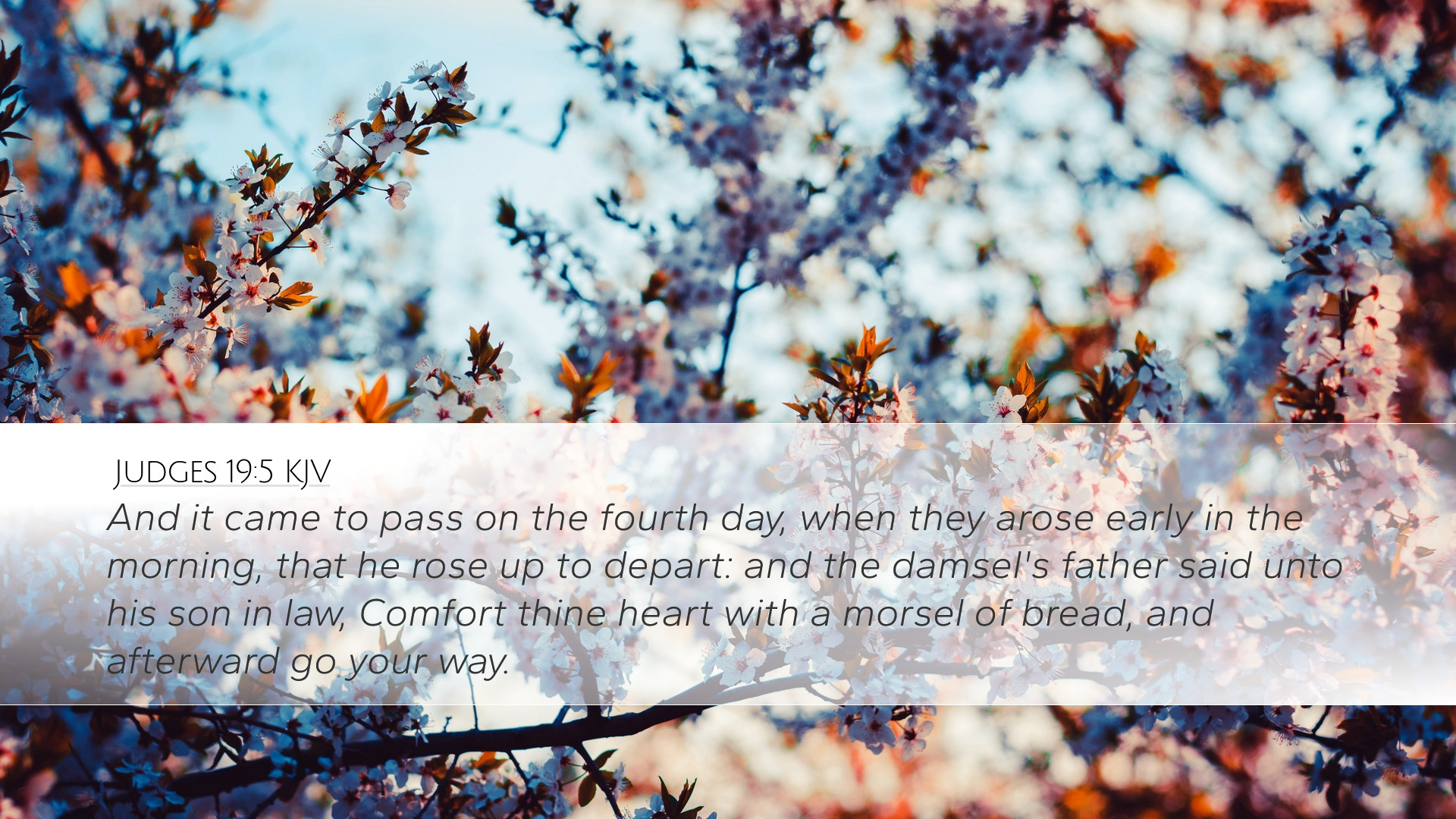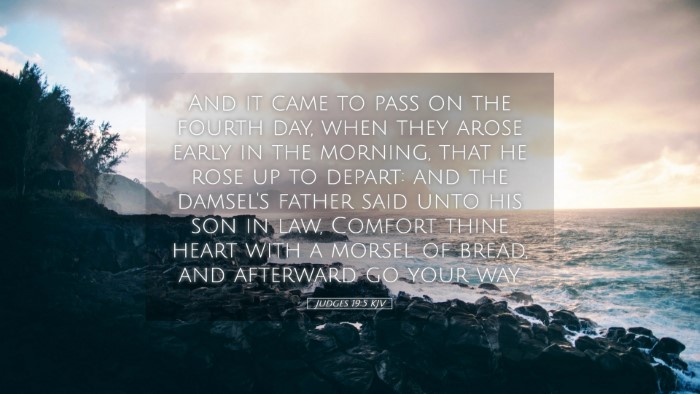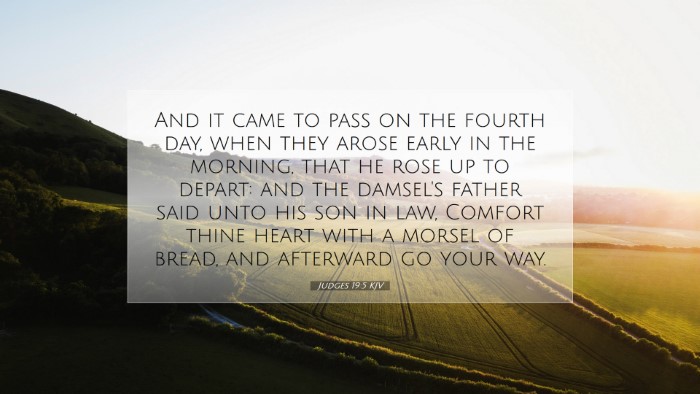Commentary on Judges 19:5
Judges 19:5 reads: "And it came to pass on the fourth day, when they arose early in the morning, that he rose up to depart: and the damsel's father said unto his son-in-law, Comfort thine heart with a morsel of bread, and afterward go your way." This verse occurs in a narrative filled with intricate social dynamics, hospitality, and ultimately, tragedy, setting the stage for critical reflections on human relationships and morality.
Contextual Analysis
The passage takes place in a time marked by lawlessness and moral ambiguity in Israel. The Levite and his concubine are at the center of this story, illustrating the societal issues of the time. The father of the damsel, in his zeal for hospitality, embodies both kindness and the complexities of familial relationships. This commentary will reflect on the themes established in this verse and glean wisdom from historical perspectives.
Insights from Commentators
-
Matthew Henry:
Henry emphasizes the importance of hospitality in the ancient Near Eastern culture, noting that the father’s insistence on delaying the departure showcases a societal expectation of care and provision. This delay symbolizes an effort to nurture relationships and maintain bonds, reflecting God's desire for communion among His people.
Furthermore, Henry points out the symbolic nature of “Comfort thine heart with a morsel of bread.” This call to partake in a meal is an invitation to deepen connections. Meals have profound spiritual and communal significance that transcends mere sustenance, serving as a grounding practice for relationships and community cohesion.
-
Albert Barnes:
Barnes elaborates on the cultural norms surrounding hospitality. In that time, it was deemed an act of great virtue to host a traveler. The father's insistence reflects the deep-rooted values of kindness and acceptance found in this portion of the narrative. Barnes underscores that the delayed departure was an attempt to ensure the well-being of the Levite and his concubine, highlighting the importance of prioritizing relationships over expedience.
Furthermore, Barnes notes the emotional tone of the verse. The phrase “Comfort thine heart” reveals the father’s sensitivity to the emotional state of the travelers, indicative of the overarching theme of human compassion that runs throughout the Scripture.
-
Adam Clarke:
Clarke’s analysis extends into a critical reflection on the Levite’s role in the story. He questions the Levite’s decision-making and his motives through the journey that culminates in tragedy. Clarke emphasizes the significance of the father’s action of delaying their departure, as it symbolizes a call for peace and the need for reflection before making hasty decisions. In this moment of hospitality, there is a cautionary layer inviting readers to ponder the ramifications of their choices.
Moreover, Clarke addresses the moral implications inherent in the Levite’s eventual fate and how it contrasts with the prevailing call for compassion showcased in the father's behavior. The tension between hospitality and the consequences of wayward choices lays the groundwork for moral contemplation intending to guide the followers of the faith in discerning right from wrong.
Theological Reflections
This passage invites theological inquiry into themes of hospitality, relationship dynamic, and the human condition. The father’s plea for the Levite to partake in sustenance serves as a metaphorical representation of divine encouragement to engage in community and fellowship. In a broader theological context, this highlights the balance between individual journeys and communal support.
Moreover, the juxtaposition of kindness and the anticipated tragic turn of events serves to remind believers that even in moments of grace and hospitality, the realities of human sin and moral failure must be acknowledged. The text challenges pastors, theologians, and students alike to explore the tension between grace and accountability within relationships.
Practical Applications
In applying these insights, modern believers are encouraged to:
- Prioritize Hospitality: Engage in acts of kindness and welcome to nurture community bonds. Reflect on how the church today can embody the spirit of hospitality that was evident in the actions of the father.
- Reflect on Decision-Making: Seek counsel and consider the potential implications of choices, especially within relationships. Evaluate how immediate desires and travel plans may overshadow the need for community and emotional support.
- Recognize Human Vulnerability: Allow space for vulnerability in relationships, understanding that openness can lead to deeper connections and often, necessary healing.
Conclusion
Judges 19:5 serves as a rich text for exploration into the themes of hospitality, human relationships, and the foreshadowing of tragedy within the biblical narrative. By examining this verse through the insights of Matthew Henry, Albert Barnes, and Adam Clarke, we uncover a tapestry of meaning that speaks to the hearts of pastors, students, and theologians alike. The balance of hospitality amid the darker currents of human experience offers a poignant reminder of our call to engage deeply and compassionately with one another, grounded in the truth of God's Word.


